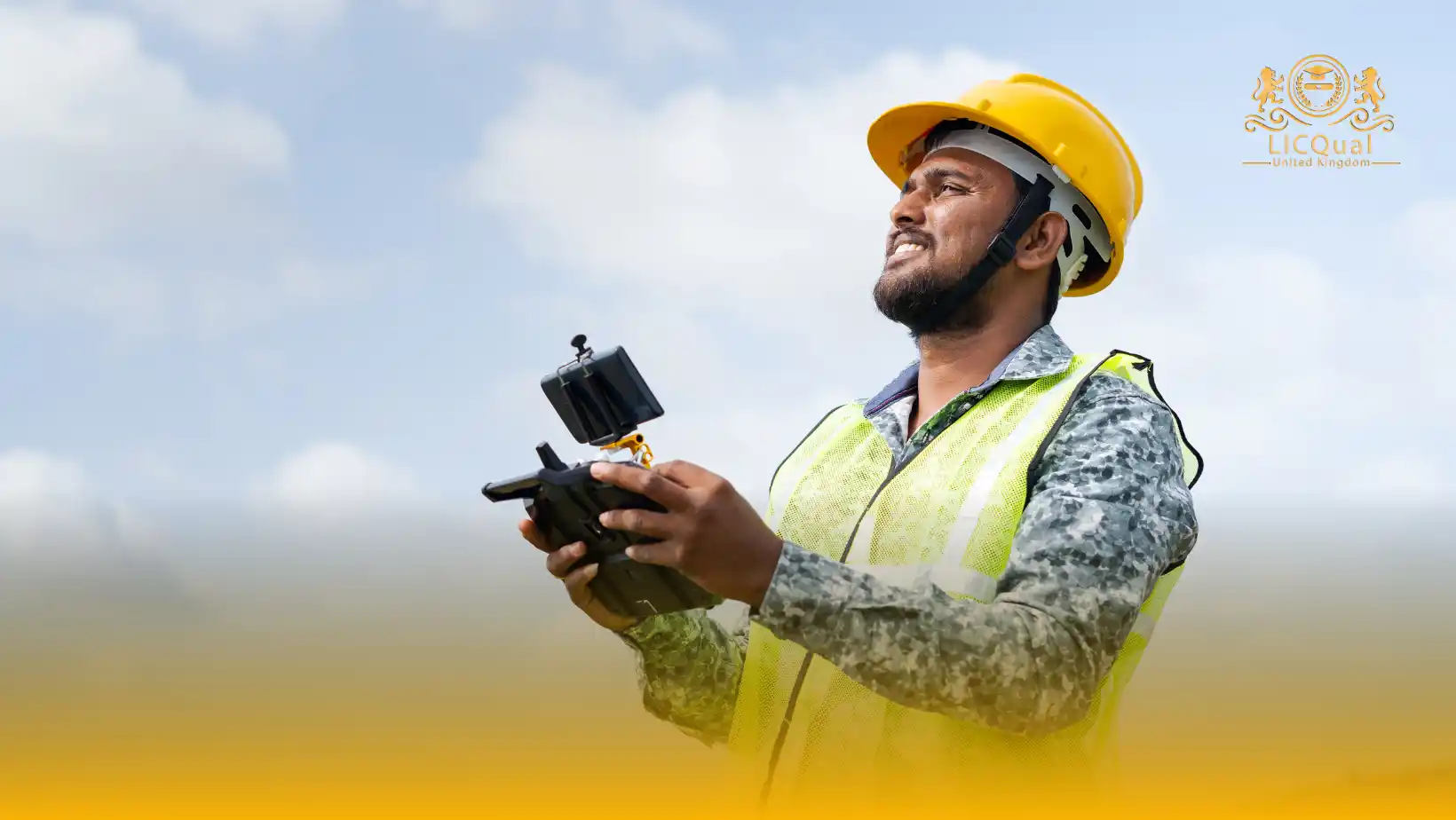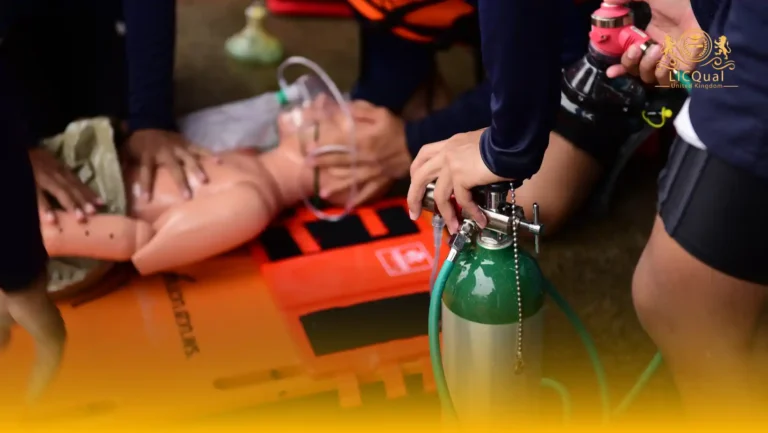The LICQual Level 3 Award in Emergency Response Drone Pilot is an internationally recognized qualification designed for individuals who aim to operate drones in critical emergency and disaster situations. This specialized training equips learners with the skills and knowledge required to deploy drones for search and rescue, disaster assessment, firefighting support, law enforcement, and humanitarian relief operations.
In today’s fast-paced emergency response environment, drones have become an essential tool, enabling responders to access hard-to-reach areas, capture real-time aerial data, and enhance decision-making efficiency. This course covers essential topics including drone flight operations, aerial navigation, safety regulations, emergency deployment protocols, and data management. Learners will also gain hands-on experience in using drone technology for tasks such as locating missing persons, delivering essential supplies, and assessing hazardous environments.
By completing this program, participants will not only master the technical aspects of operating drones in emergency conditions but also develop the critical judgment needed to act swiftly and effectively under pressure. The qualification aligns with international aviation safety and emergency response standards, ensuring graduates are prepared for both local and global operations.
Whether you are a first responder, disaster management professional, security officer, or an individual seeking to enter the emergency response sector, the LICQual Level 3 Award in Emergency Response Drone Pilot provides the expertise to operate drones safely, legally, and effectively in high-stakes situations. This certification opens career opportunities in emergency services, law enforcement, humanitarian organizations, and security operations worldwide.
Course Overview
Qualification Title
LICQual Level 3 Award in Emergency Response Drone Pilot
Total Units
6
Total Credits
6
GLH
12
Qualification #
LICQ2200631
Qualification Specification
To enroll in the LICQual Level 3 Award in Emergency Response Drone Pilot, applicants must meet the following criteria:
|
Qualification# |
Unit Title |
Credits |
GLH |
|---|---|---|---|
|
LICQ2200631-1 |
Introduction to Emergency Response Drone Operations |
1 |
6 |
|
LICQ2200631-2 |
Drone Technology and Flight Systems |
1 |
6 |
|
LICQ2200631-3 |
Safety Protocols and Risk Management |
1 |
6 |
|
LICQ2200631-4 |
Flight Skills and Operational Techniques |
1 |
6 |
|
LICQ2200631-5 |
Aerial Data Collection and Analysis in Emergencies |
1 |
6 |
|
LICQ2200631-6 |
Coordination, Communication, and Mission Management |
1 |
6 |
By the end of this course, learners will be able to:
1. Introduction to Emergency Response Drone Operations
By the end of this unit, learners will be able to:
- Describe the scope and significance of drones in emergency response situations.
- Explain the legal and regulatory requirements for operating drones in emergencies.
- Evaluate ethical considerations, privacy concerns, and public safety responsibilities.
2. Drone Technology and Flight Systems
By the end of this unit, learners will be able to:
- Identify different types of drones and their operational features.
- Explain the functions of key drone components, sensors, and payloads.
- Demonstrate understanding of navigation systems, GPS, and autonomous flight technology.
3. Safety Protocols and Risk Management
By the end of this unit, learners will be able to:
- Apply standard safety checks before, during, and after drone operations.
- Assess environmental and operational risks in emergency conditions.
- Implement risk mitigation strategies to maintain safety and compliance.
4. Flight Skills and Operational Techniques
By the end of this unit, learners will be able to:
- Operate drones in both manual and automated modes with precision.
- Perform controlled maneuvers in challenging and hazardous environments.
- Demonstrate stability, accuracy, and adaptability in emergency operations.
5. Aerial Data Collection and Analysis in Emergencies
By the end of this unit, learners will be able to:
- Operate imaging, thermal, and sensing equipment for emergency applications.
- Capture and transmit aerial data securely in real time.
- Interpret and analyse aerial data to support rapid decision-making.
6. Coordination, Communication, and Mission Management
By the end of this unit, learners will be able to:
- Communicate effectively with command centres and ground response teams.
- Follow structured mission planning, coordination, and reporting procedures.
- Conduct post-mission evaluations and prepare operational reports.
The LICQual Level 3 Award in Emergency Response Drone Pilot is ideal for professionals and enthusiasts looking to develop advanced drone piloting skills for emergency and public safety operations. This Level 3 award suits individuals responsible for aerial support, disaster management, rescue operations, and emergency response coordination. Participants will gain practical skills, legal knowledge, and technical expertise required to operate drones effectively in real-world emergency scenarios.
Emergency Services Personnel
- Firefighters utilizing drones for aerial reconnaissance during emergencies
- Paramedics enhancing situational awareness at disaster sites
- Search and rescue teams improving operational efficiency
- Flood and natural disaster response teams
- Staff coordinating emergency evacuation procedures
- Teams implementing aerial surveillance during critical incidents
Drone Enthusiasts and Professionals
- Individuals aiming to specialize in emergency drone operations
- Hobbyist drone pilots seeking professional certification
- UAV operators expanding their technical and operational skills
- Professionals learning legal and safety compliance for drones
- Participants improving practical drone piloting capabilities
- Individuals aiming for career advancement in aerial emergency response
Government and Regulatory Staff
- Officials managing public safety operations
- Inspectors overseeing drone-assisted rescue operations
- Staff developing UAV operational policies for emergencies
- Professionals monitoring compliance with aviation laws
- Team leaders ensuring safety standards during aerial missions
- Individuals coordinating regional or national emergency response programs
Disaster Management and Relief Teams
- Professionals supporting flood, fire, or earthquake relief operations
- Staff conducting risk assessments using aerial imagery
- Coordinators planning rapid response strategies
- Individuals capturing real-time incident data for decision-making
- Team leaders managing UAV-supported emergency operations
- Staff monitoring environmental hazards and emergency zones
Security and Surveillance Professionals
- Personnel using drones for crowd management during emergencies
- Staff monitoring hazardous areas in real-time
- Security teams coordinating with emergency responders
- Professionals analyzing aerial footage for risk mitigation
- Individuals enhancing operational safety with UAV technology
- Team leaders integrating drones into security and rescue operations
Trainers and Educators
- Instructors teaching emergency response drone operations
- Trainers guiding practical UAV piloting sessions
- Professionals developing emergency drone training programs
- Staff mentoring rescue teams in aerial support techniques
- Individuals evaluating participants’ drone piloting skills
- Educators promoting drone safety awareness and best practices
Aspiring Emergency Drone Leaders
- Individuals aiming to lead drone operations in emergency response
- Professionals seeking career progression in UAV emergency services
- Staff managing long-term emergency response strategies with drones
- Leaders implementing advanced aerial operational procedures
- Individuals gaining internationally recognized LICQual certification
- Team leaders enhancing technical, operational, and safety expertise
Assessment and Verification
All units within this qualification are subject to internal assessment by the approved centre and external verification by LICQual. The qualification follows a criterion-referenced assessment approach, ensuring that learners meet all specified learning outcomes.
To achieve a ‘Pass’ in any unit, learners must provide valid, sufficient, and authentic evidence demonstrating their attainment of all learning outcomes and compliance with the prescribed assessment criteria. The Assessor is responsible for evaluating the evidence and determining whether the learner has successfully met the required standards.
Assessors must maintain a clear and comprehensive audit trail, documenting the basis for their assessment decisions to ensure transparency, consistency, and compliance with quality assurance requirements.







